At Kids Play Rwanda, we want our female players to have robust knowledge of sexual reproductive health. For our July AGU camp, we focused on a “My body, myself” theme, which included information on sexually transmitted infections (STIs), as well as ways to manage personal hygiene during menstruation. Moreover, the coaches facilitated in-depth discussions regarding high-risk situations in Rwandan culture—from gender-based violence to early pregnancy—all while promoting physical activity and body-positivity. From July 29th through 31st we held a three day long camp for 40 of our girls as well as 25 girls from local schools, to learn all about topics relating to their bodies and empowerment.
|
Outcomes
|
Day 1 – Sexual reproductive health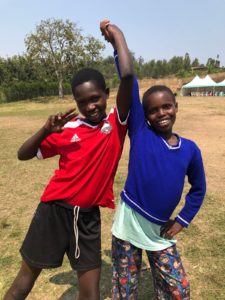
Opening Circle set the stage for the first day of camp. Coaches Christine M and Christine U started with song and dance to energize the girls, preparing them for the upcoming activities. Christine M then prefaced the games by asking questions and providing information on STIs and risky sexual behaviors. She asked the players what STIs they were familiar with; some responses were syphilis, gonorrhea, chlamydia and HIV/AIDS. Christine M explained HIV stands for human immunodeficiency virus—it attacks the immune system and, if left untreated, can cause AIDS. She emphasized that people with HIV should not be shamed, and those with the virus can live long, healthy lives with the proper medical care.
RISK FIELD The first activity of the day was called “risk field,” which is a soccer game that requires players to dribble through a series of cones without losing control of the ball. The cones represent different risks: unprotected sex, sex and alcohol, sex with multiple partners and sex with older men. The consequence of hitting a cone varies each round. If a player hit a cone in round one, she had to do five star jumps. If a player hit a cone in round two, her whole team had to do five sets of high-knees. If a player hit a cone in round three, the whole group had to do five squat-jumps. The game symbolizes the effect of risky sexual behavior on the individual, as well as on their family/friends and the wider community. The coaches manipulated the activity for difficulty by decreasing the distance between the cones and asking players to dribble with their non-dominant foot. Also, coaches told players that when they hit a cone they must yell, “I hit it!” which emphasized the idea of speaking up against sexual harassment/assault.
During the activity, the players had the opportunity to hone their dribbling skills, while learning more about the topic at hand. The coaches reminded the players the game does not represent the wider community shaming their actions. Instead, it shows the ripple effect certain decisions/behaviors can have.
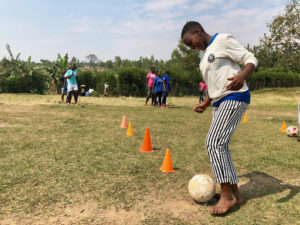
| “It is our responsibility to know our bodies. No one can touch our bodies without our permission.” — Coach Elisabeth |
| “‘It starts with ‘no’ and ends with ‘yes.’ We must end this myth in Rwandan culture. We must speak up.” — Delphine, non-KPI player |
| Questions & Answers
Q: How can you contract an STI? Q: What are the impacts of STIs? |
Story Discussion The coaches read a story aloud to the players and after that, had them answer questions about the plot. The story was about two boys named Cedric and Joseph. The two boys meet after football and Joseph complains he has yellow fluid leaking from his penis and it burns when he urinates. He says he is on the way to the herbalist for treatment. Cedric tells his friend he had that problem once and herbs didn’t work—it may be an STI and he should go to the clinic for treatment. Cedric encourages Joseph to tell his girlfriend to seek treatment as well. Joseph gets angry and refuses to visit a health care provider. He also says he will beat his girlfriend for giving him a sickness.
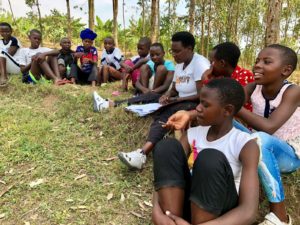
After finishing the story, Coach Verene clarified it’s not healthy for a boy to have “yellow fluid” leaking from his penis and that Cedric advised Joseph to talk with his girlfriend as the infection can be passed through sex. The players were a bit shocked by the story, but most used their critical thinking skills to discuss the ways Joseph handled the situation, as well as the broader impact of STIs. Desange (non-KPI player) put onus on the female and said she felt bad the girl transmitted the infection to the boy. However, Esther (KPI player) challenged this notion by saying the two had sex together and thus it was both of their responsibilities. Also, Aurolee (non-KPI player) said Joseph cannot solely blame his girlfriend because he may have had multiple partners. Claire (KPI player) reinforced that herbalists cannot cure infections. Alternatively, people must go to a clinic for STI testing and treatment.
Limbo was a great game to get players moving while breaking up the discussion. Neither the players or the coaches had participated in a limbo activity before, so they had a lot of fun dancing to the music and bending their bodies in different ways to pass under the rope. Limbo related to the day’s theme, as it represented pressures that females in Rwandan culture face. The coaches prefaced the activity by saying this could be pressure to stay home from school due to menstruation, pressure to have sex (in general or without a condom) or pressure to succumb to traditional gender norms. 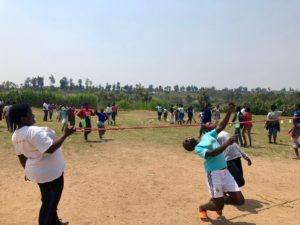
Sexual Reproductive Health session
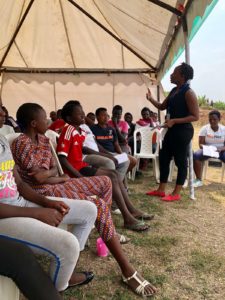 Assumpta Cyuzuzo from Faith Victory Association led an afternoon session on sexual reproductive health, which delved deeper into the topics the coaches/players were discussing during the morning activities. Some key takeaways from Assumpta’s presentation were: we must know our bodies and know our body parts (and not feel ashamed to use proper terms such as penis and vagina); we must be assertive and powerful and speak up for what we want (this includes being confident saying no to sex if we’re not ready); and we need the correct information to make healthy decisions for our body and mind (including information on contraceptive methods, signs of STIs, signs of pregnancy, and managing menstruation).
Assumpta Cyuzuzo from Faith Victory Association led an afternoon session on sexual reproductive health, which delved deeper into the topics the coaches/players were discussing during the morning activities. Some key takeaways from Assumpta’s presentation were: we must know our bodies and know our body parts (and not feel ashamed to use proper terms such as penis and vagina); we must be assertive and powerful and speak up for what we want (this includes being confident saying no to sex if we’re not ready); and we need the correct information to make healthy decisions for our body and mind (including information on contraceptive methods, signs of STIs, signs of pregnancy, and managing menstruation).
Assumpta ensured the session was a discussion and not a lecture. For example, she had players come up to the white board to label diagrams and participate in skits, as well as asked many questions to keep them engaged. At then end, she handed out scraps of paper for the players to ask anonymous questions.
| “‘My body, myself’…. We only fully understand this saying if we know our body parts!” “I’m not here to stop you from having sex with your partner. However, if you choose to be sexually active, you need the proper information to protect yourself. This means using condoms and being emotionally ready.” — Assumpta |
|
Questions & Answers Assumpta Q: How can someone become pregnant? Assumpta Q: How can we properly wash the vagina? Anonymous Q: Can you bleed from using a condom during sex? (common anti-condom myth) Anonymous Q: Will a man beat you if he marries you and your labia isn’t stretched? Anonymous Q: Can sweat from the skin lead to HIV? |
Day 2 – Menstrual Hygiene Management
Dance/Aerobics Routine We kicked day 2 off with some serious physical activity! Program coordinators Alexa and Melissa led a 30-minute freestyle dance/aerobics routine. It started with stretching, followed by 20 minutes of straight dancing! The players were encouraged to follow the PC’s lead, but most importantly, move to the beat and raise their heart rates. Our KPI players love dancing and listening to music, so the activity was meant to be fun, while also coinciding with the days’ objective and theme. When talking about menstrual hygiene management, we want players to understand that staying active and moving their bodies is a great way to mitigate the symptoms of menstruation such as cramps, bloating and poor mood.
Skits The players got into small groups to discuss what they learned during the sexual reproductive health sessions. Denise (KPI player) said that she learned it’s important to use her voice and speak up against sexual harassment. And if it ever does happen, to be brave and tell someone. Coach Elisabeth asked the players: what if you’re propositioned for sex and it’s difficult to say no? Desange (non-KPI player) said you must use condoms if you decide to have sex. Coach Elisabeth followed up by asking how condoms provide protection. Ruth (KPI player) said that they protect against early pregnancy and STIs. Lastly, Coach Elisabeth asked if the players agree that gender-based violence happens in their culture. Yvette (KPI player) said yes, and that GBV can even happen in the home. For example, a husband can beat his wife if she denies him sex.
The skits depicted different pressures girls may face in Rwandan culture. Diane (KPI player), Desange (non-KPI player), Emerance (non-KPI player), Angelique (non-KPI player) and Yvette (KPI player) acted out a scenario where a shopkeeper offers a young girl gifts in exchange for sex. Though the girl is hesitant, her family is poor and she needs the items. The abuse continues for a while, until neighbors find out about the arrangement. The girl speaks up to the neighbors and tells them what has happened—she is not ashamed. Conversations among players followed the skits to discuss how these situations manifest in real life. Coach Verene asked who the players can talk to if they are experiencing sex harassment. Answers included local leaders, KPI coaches and public health counsellors.
| “Yes means yes and no means no. We must be firm in our decisions and what we’re saying.” —Coach Verene |
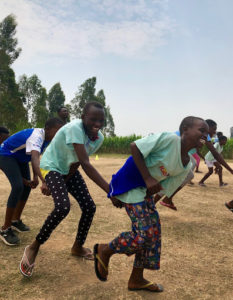
Wacky Relay! The first game of wacky relay was called Sakhili. The players formed single file lines, linked their arms through their legs and had to run to the finish line and back! Other games included a three-legged race, a water relay and “mix-it-up” run, which required players to run from one side of the field to the other. The catch? They couldn’t do the same movements as their teammates, so they had to mix-it-up by jumping, skipping, doing arm circles or running backwards!
Menstrual Hygiene Management Session
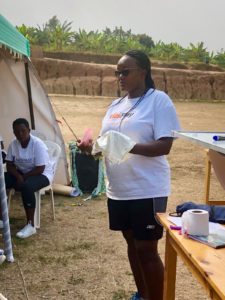 Coach Alice and Coach Fanny’s presentation on menstrual hygiene management consisted of several informal discussions surrounding menstruation: how girls can manage their personal hygiene while on their periods, how to use pads and tampons (and other materials like cloth), and how to embrace their bodies. The presentation started with Coach Alice and Coach Fanny explaining key facts/information, followed by lots of time for questions and answers. The coaches ensured the players were familiar with the process of menstruation (the lining of the uterus shedding each month) and discussed the ways, as a community, we can start to break down harmful stereotypes that make women feel ashamed for bleeding each month.
Coach Alice and Coach Fanny’s presentation on menstrual hygiene management consisted of several informal discussions surrounding menstruation: how girls can manage their personal hygiene while on their periods, how to use pads and tampons (and other materials like cloth), and how to embrace their bodies. The presentation started with Coach Alice and Coach Fanny explaining key facts/information, followed by lots of time for questions and answers. The coaches ensured the players were familiar with the process of menstruation (the lining of the uterus shedding each month) and discussed the ways, as a community, we can start to break down harmful stereotypes that make women feel ashamed for bleeding each month.
| “Some girls say ‘I’m sick’ when they have their periods, and this is not necessary. Periods are not a shame, a curse or a sickness. Also, having your period is not a reason to miss class. Today, we will learn how to manage our periods so we can go to school and live life normally.” — Coach Alice |
|
Questions and Answers Coach Alice Q: Why do some people feel ashamed for having their periods? Coach Alice Q: How can we start to break down this shame? Anonymous Q: How can we teach boys that periods are normal? Anonymous Q: Why are we sometimes only given one pad at school? Then denied others if we’re in need. |
Jeopardy! was a fun game to test the players knowledge of everything they learned the past two days of camp. The coaches paired off and took a group of players; each group had their own jeopardy board. The game was a huge success, as it was enjoyable for both the players and the coaches, and the players were able to answer many of the questions correctly. 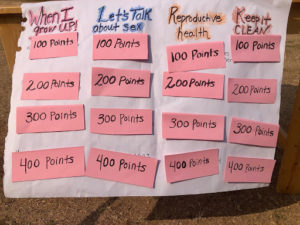
Examples of questions: Name two ways to properly dispose of pads. Where should you never throw pads? Name two changes boys and girls both experience during puberty. Name three STIs. Name two ways to protect yourself against unwanted pregnancy.
Challenges: Some players are still lacking knowledge of how to use/dispose of pads, and there were misunderstandings about whether you’re able to throw pads in flush toilets. Also, there was confusion surrounding the male anatomy, and questions about whether boys ejaculate each month just like girls get their periods each month.
Day 3 – Women’s Empowerment
Paper Jewelry We started day 3 with a jewelry making activity. The players used colorful pages of old magazines to create paper beads and make bracelets and necklaces! Not only did the girls have a unique take-away to leave camp with, it gave them ideas of things they can make and sell. During the AGU listening session, players voiced interest in learning how to create economic opportunities through art. 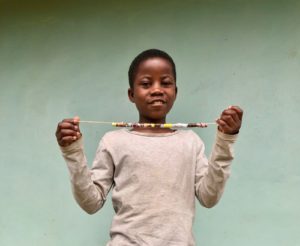
Field Trip to Huye!
After jewelry making, the players boarded buses to Huye to visit Inzozi Nziza ice cream shop and speak with its founder Odile Gakire Katese, better known as “Kiki.” Inzozi Nziza is featured in the documentary Sweet Dreams and is Rwanda’s first-ever ice cream shop. The business opened in 2010 after Kiki met two women from the United States who owned a Brooklyn ice cream shop called Blue Marble. Kiki thought starting a fun, unique business would be a great entrepreneurship opportunity and would help fund her local, all-female drumming group. With a bit of help, she made her dream a reality!
Women drumming in Rwanda has a contentious history, as it’s an activity many believe is reserved for men. However, Kiki’s group pushed back, breaking through gender norms. Today, President Paul Kagame has asked them to perform at major events and Kiki continues to help women pursue their dreams of drumming/participating in the performing arts. After hearing Kiki’s story, the players had the opportunity to ask questions.
| Questions and Answers
Bridgette Q: What challenges did you meet when you started to drum? Sylvie Q: Why is your company called Inzozi Nziza? Coach Alice Q: How do you share the benefits of your cooperative? Josephine Q: How does drumming benefit your life? Jeannine Q: How has your business grown since it first opened? |
Conclusion – Results of Pre/Post Survey
Both KPI and non-KPI players completed pre and post-surveys. These surveys compare knowledge between the two groups, measure all players’ knowledge on the above issues before camp, as well as gauge the increase in understanding following the sessions.
At baseline, the survey results show that KPI players scored significantly higher than non-KPI players (p<.05). Significantly more KPI players agreed with the statement, “I know how to track my menstrual cycle.” Also, more KPI players agreed with the statement, “I know that no one has the right to push/force me to have sex” and disagreed with the statement, “A man can hit a girl/woman if she does not show him respect.” The non-KPI girls showed dramatic improvement from pre to post survey in the knowledge gained from the content that was delivered. While both KPI and non-KPI participant scores improved from pre to post survey, the overall score in post surveys was not significantly different between both groups.
KPI players also completed an open-ended questionnaire. The most common responses to the statement, “Name two places to hygienically dispose of pads” were correct answers: in a latrine pit or in a waste basket. The most common responses to the question, “How can we educate our friends and family on menstruation?” were emphasizing that periods are normal and focusing on eliminating shame.
Testimonials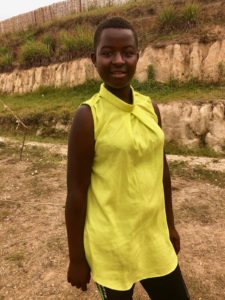
“The best part of AGU camp was the three-legged race. It was fun and taught me that partnership is good. After coming here, I feel more empowered and comfortable with my femininity and being a girl. Our periods are not a shame, and I’m going to start asking for help during menstruation, whether that’s talking to a teacher or engaging boys in the conversation.” — Dorothee, 17, KPI player (right)
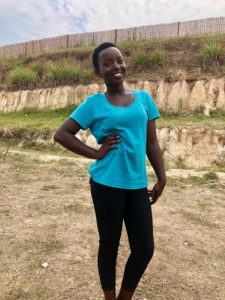 “I loved the dance party! I hope we can continue to do different activities like this at AGU. I’m happy that I’m leaving here having learned more about menstrual hygiene management. I now know how to use and dispose of pads, and I learned about tampons, which I had never heard of before. All in all, menstruation is not a shame. We need to educate our communities.” — Seline, 18, KPI player (left)
“I loved the dance party! I hope we can continue to do different activities like this at AGU. I’m happy that I’m leaving here having learned more about menstrual hygiene management. I now know how to use and dispose of pads, and I learned about tampons, which I had never heard of before. All in all, menstruation is not a shame. We need to educate our communities.” — Seline, 18, KPI player (left)
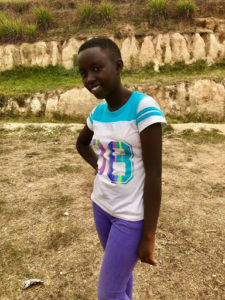 “This was my first time at an AGU camp. My favorite part was seeing the girls strong relationships with the coaches. That’s special. Before coming here, I felt like I couldn’t openly talk about menstruation, sexual harassment or STIs. Now, I feel more comfortable and want to speak up to male teachers and classmates to spread education.” — Stick, 14, non-KPI player (right)
“This was my first time at an AGU camp. My favorite part was seeing the girls strong relationships with the coaches. That’s special. Before coming here, I felt like I couldn’t openly talk about menstruation, sexual harassment or STIs. Now, I feel more comfortable and want to speak up to male teachers and classmates to spread education.” — Stick, 14, non-KPI player (right)
